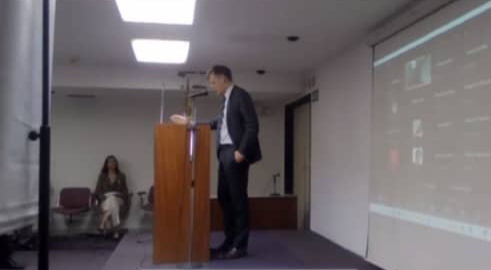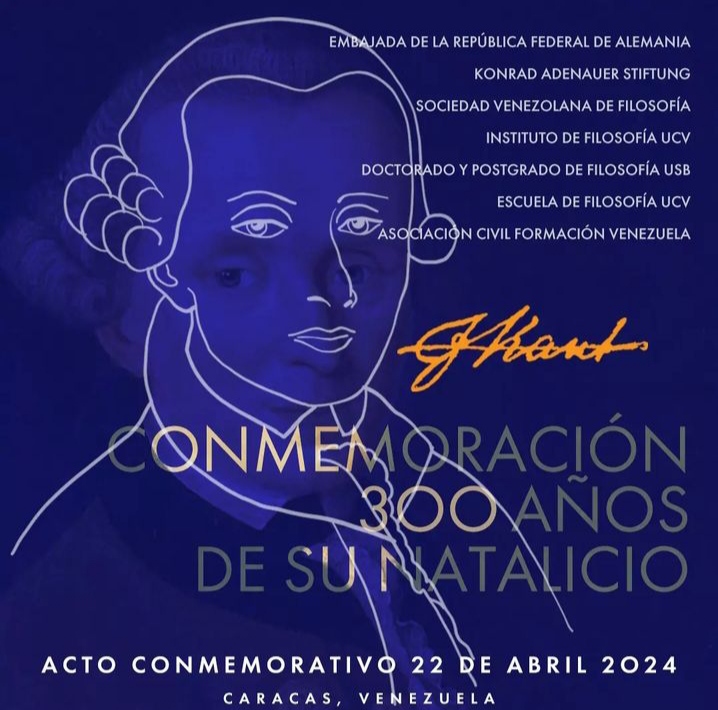VERSIÓN EN ESPAÑOL
En la historia del pensamiento humano hay personas que han resaltado por su aporte para el progreso de la humanidad según diversas áreas, en el plano de la filosofía vale la pena recordar a Immanuel Kant ya que hoy con motivo de los 300 años de su nacimiento tuve la oportunidad de participar vía zoom de un congreso que se organizó para conmemorar este hecho.
Me enteré del mismo gracias a que me hizo llegar la invitación la decano de humanidades y artes de la UCLA, profesora Gisela, pues entre otras cosas allí se está trabajando por un proyecto de apertura de la carrera de filosofía, y esta nos pareció una magnífica oportunidad para hacer los contactos pertinentes. Además de esto para mí fue grandioso poder reconectar con el pensamiento kantiano por ello hago mi propia conmemoración mediante este post.
Actualidad
Immanuel Kant fue un filósofo alemán cuyo aporte intelectual traspasó de manera quizás inimaginable para él todas las fronteras, de tal manera que por ejemplo hoy me enteré que en mi misma ciudad de barquisimeto (Venezuela) existe un grupo de persona dedicadas al estudio y aplicación del pensamiento kantiano. En el congreso en el cual participé también me llamó la atención como algunos de los ponentes hicieron aplicación concreta y actual de algunos de los conceptos que propuso este pensador, de tal manera de hacerlo cercano a la actualidad.
Así que puedo decir que las propuestas de este pensador siguen siendo viables. Recuerdo que en el seminario y en general también en otros espacios académicos el solo escuchar su nombre daba terror ya que no solo era el hecho de ser alemán, que son famosos por su tipo de pensamiento, sino que los conceptos que proponía no eran de una fácil comprensión. Cuando hoy escuché sobre su talento pacifista y su propuesta para una paz perpetua me emocioné al respecto pues pensé que es necesario aterrizar a lo práctico y experiencial ideas que en un principio pueden parecer muy abstractas. Uno de los filósofos que es necesario redescubrir en este aspecto es precisamente este, el filósofo de la crítica de la razón pura, llamado así por una de sus obras más conocidas.

Un maestro del pensamiento
Una de las cosas en las cuales se caracteriza el filósofo Immanuel Kant es en su teoría de conocimiento pero no se trata de cualquier teoría sino de lo que él mismo llamó una revolución copernicana porque ahora se trata no de tomar la realidad en sí sino partir de las categorías que hay en el ser humano y que les permite conocer de determinada manera, una que tiene sus puntos fuertes pero también sus limitantes como lo son las espacios temporales, es decir, que todo lo que procesa nuestro pensamientos está cerrado a un tiempo y un espacio determinado.
Más allá del acuerdo o desacuerdo que cada uno puede tener con el planteamiento kantiano siento que es de resaltar que el hecho de examinar el propio pensamiento le da un gran valor, sobre todo porque él no se queda allí sino que ciertamente también reconoce como no se trata de la razón pura donde se da el conocimiento sino en el encuentro de esta con la realidad, ahora bien esta es conocida desde un pensamiento humano particular y con unas características específicas.

Conocimiento progresivo
Como se puede desprender de los párrafos anteriores, la filosofía de Kant es equilibrada, o trata de serlo en el sentido de que toma en cuenta todos los elementos implicados en el conocer del ser humano, es decir, cómo este logra elaborar o llegar a sus conocimientos. Entrando un poco más al detalle de su planteamiento me gustaría mencionar su distinción entre fenómeno y noumeno o realidad en sí, ya que su afirmación de que esta no se puede conocer lleva implícito no una limitante, a mi manera de ver, sino una motivación para seguir profundizando en la realidad que nos circunda.
En efecto, uno de mis profesores más queridos en el seminario siempre se refería a Kant para decirnos o hablarnos sobre el progreso o profundización de los conocimientos, que no nos conformemos con lo que sabemos porque la realidad de las cosas en su esencia no la podemos abarca en su totalidad, esto es, sin llegar a la negación kantiana de la posibilidad del conocimiento más allá de los fenómenos, si tenemos que ser humildes para reconocer que es mucho más los que ignoramos que lo que sabemos lo cual es, en definitiva, una motivación para el progreso del conocimiento.

ENGLISH VERSION
In the history of human thought, there are individuals who have stood out for their contributions to the progress of humanity in various fields. In the realm of philosophy, it is worth remembering Immanuel Kant, as today, on the occasion of the 300th anniversary of his birth, I had the opportunity to participate via Zoom in a congress organized to commemorate this event.
I learned about the congress thanks to an invitation from the Dean of Humanities and Arts at the UCLA, Professor Gisela, as among other things, we are working on a project to open a philosophy program, and we considered this a magnificent opportunity to make the pertinent contacts. In addition to this, for me it was wonderful to be able to reconnect with Kantian thought, which is why I am making my own commemoration through this post.
Relevance
Immanuel Kant was a German philosopher whose intellectual contribution transcended all borders in a way that perhaps he could not have imagined. For example, today I learned that in my own city of Barquisimeto (Venezuela) there is a group of people dedicated to the study and application of Kantian thought. In the congress in which I participated, I was also struck by how some of the speakers made concrete and current applications of some of the concepts proposed by this thinker, in such a way as to make them relevant to the present day.
So I can say that the proposals of this thinker are still viable. I remember that in the seminar and in general also in other academic spaces, the mere mention of his name caused terror, not only because of the fact of being German, who are famous for their type of thought, but also because the concepts he proposed were not easy to understand. When I heard today about his pacifist talent and his proposal for perpetual peace, I was excited about it because I thought that it is necessary to bring to the practical and experiential level ideas that at first may seem very abstract. One of the philosophers that needs to be rediscovered in this aspect is precisely this one, the philosopher of the critique of pure reason, so called for one of his most famous works.

A Master of Thought
One of the things that characterizes the philosopher Immanuel Kant is his theory of knowledge, but it is not just any theory but what he himself called a Copernican revolution because now it is not a matter of taking reality itself but of starting from the categories that exist in the human being and that allow them to know in a certain way, one that has its strengths but also its limitations such as space and time, that is to say, that everything that our thoughts process is closed to a specific time and space.
Beyond the agreement or disagreement that each person may have with the Kantian approach, I feel that it should be emphasized that the fact of examining one's own thinking gives it great value, especially because he does not stop there but also recognizes that knowledge does not occur in pure reason but in the encounter of this with reality, now well, this is known from a particular human thought and with specific characteristics.

Progressive Knowledge
As can be inferred from the previous paragraphs, Kant's philosophy is balanced, or tries to be so, in the sense that it takes into account all the elements involved in human knowledge, that is, how humans manage to elaborate or reach their knowledge. Going into a little more detail about his approach, I would like to mention his distinction between phenomenon and noumenon or reality in itself, since his assertion that this cannot be known implies not a limitation, in my view, but a motivation to continue deepening the reality that surrounds us.
In effect, one of my most beloved teachers in the seminar always referred to Kant to tell us or talk to us about the progress or deepening of knowledge, that we should not conform to what we know because the reality of things in their essence we cannot encompass in their totality, that is, without reaching the Kantian negation of the possibility of knowledge beyond phenomena. If we have to be humble to recognize that we ignore much more than we know, which is, in short, a motivation for the progress of knowledge.



Posted Using InLeo Alpha

